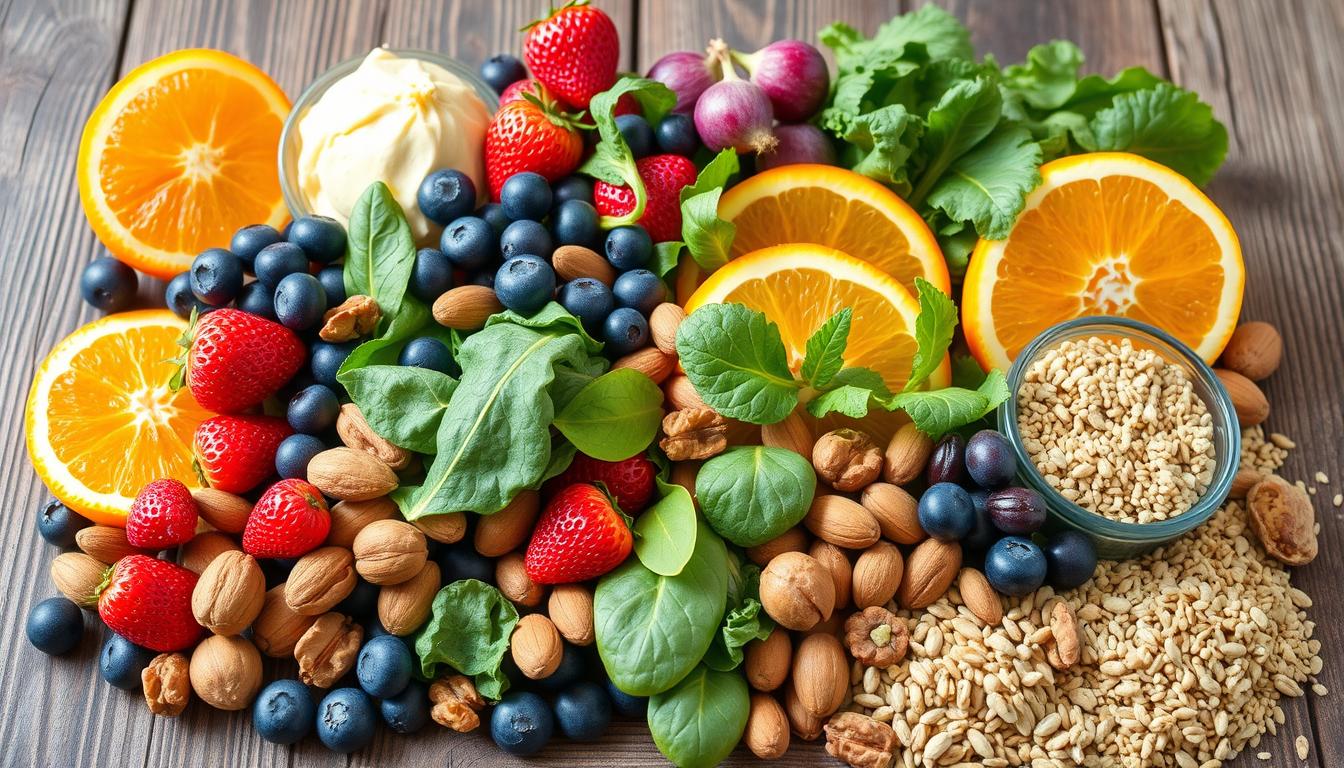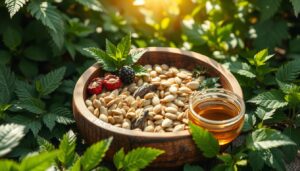Inflammation is the body’s natural response to injury, infection, or illness, but when it becomes chronic, it can lead to a host of health problems. Fortunately, there are a variety of anti-inflammatory foods that can help reduce inflammation and promote overall well-being. In this article, we’ll explore the best natural ingredients to incorporate into your diet to support your body’s fight against inflammation.
Key Takeaways
- Inflammation can contribute to chronic diseases, but natural foods can help reduce it
- Leafy greens, berries, and healthy fats are among the top anti-inflammatory foods
- Herbs and spices like turmeric and ginger also possess powerful anti-inflammatory properties
- Incorporating a variety of anti-inflammatory foods into your diet can improve overall health
- Avoiding processed foods and identifying personal inflammatory triggers is also important
Understanding Inflammation and Its Impact on Your Health
Inflammation is a complex biological response of the body’s immune system, serving as a defense mechanism against harmful stimuli, such as pathogens, damaged cells, or irritants. While acute inflammation is a natural and essential process, chronic inflammation can lead to serious health concerns.
Acute vs. Chronic Inflammation
Acute inflammation is the body’s immediate response to an injury or infection. It is characterized by redness, swelling, heat, and pain, which typically subside as the healing process begins. Chronic inflammation, on the other hand, is a prolonged state of inflammation that can last for weeks, months, or even years. This persistent inflammation is linked to a variety of health conditions, including heart disease, diabetes, and certain types of cancer.
Health Risks of Chronic Inflammation
Chronic inflammation has been associated with an increased risk of several debilitating health conditions. A healthy diet for inflammation can help reduce the risk of these issues. Some of the potential health risks linked to chronic inflammation include:
- Cardiovascular disease
- Type 2 diabetes
- Certain types of cancer
- Rheumatoid arthritis
- Alzheimer’s disease
Signs Your Body Is Fighting Inflammation
Recognizing the signs of inflammation in your body can be the first step in addressing the issue through diet and lifestyle changes. Some common signs of inflammation include:
- Persistent joint pain or stiffness
- Frequent headaches or migraines
- Digestive issues, such as bloating or constipation
- Fatigue or lack of energy
- Skin conditions like acne or eczema
By understanding the distinction between acute and chronic inflammation, as well as the potential health risks associated with prolonged inflammation, you can take proactive steps to incorporate anti-inflammatory foods into your diet and improve your overall well-being.
The Science Behind Anti-Inflammatory Foods
Maintaining a plant-based anti-inflammatory diet is crucial for managing inflammation and supporting overall health. The inflammation-reducing nutrients found in various foods play a vital role in this process, working at the cellular level to combat inflammation and promote well-being.
Certain compounds, such as antioxidants, phytochemicals, and omega-3 fatty acids, possess potent anti-inflammatory properties. These inflammation-reducing nutrients work by modulating the body’s inflammatory response, inhibiting the production of pro-inflammatory molecules and activating anti-inflammatory pathways.
For instance, the antioxidants present in leafy greens, berries, and other fruits and vegetables can neutralize free radicals, reducing oxidative stress and inflammation. Similarly, the omega-3s found in fatty fish and plant-based sources like walnuts and chia seeds help to regulate the inflammatory response by suppressing the production of inflammatory cytokines.
| Nutrient | Anti-Inflammatory Mechanism | Food Sources |
|---|---|---|
| Antioxidants | Neutralize free radicals, reduce oxidative stress | Leafy greens, berries, bell peppers, tomatoes |
| Omega-3 Fatty Acids | Regulate inflammatory response, suppress cytokine production | Fatty fish, walnuts, chia seeds, flaxseeds |
| Phytochemicals | Inhibit inflammatory enzymes, modulate immune response | Turmeric, ginger, green tea, garlic |
By incorporating a diverse array of inflammation-reducing nutrients into a plant-based anti-inflammatory diet, individuals can harness the power of nature to combat inflammation and promote overall well-being.
“The food you eat can be either the safest and most powerful form of medicine or the slowest form of poison.” – Ann Wigmore
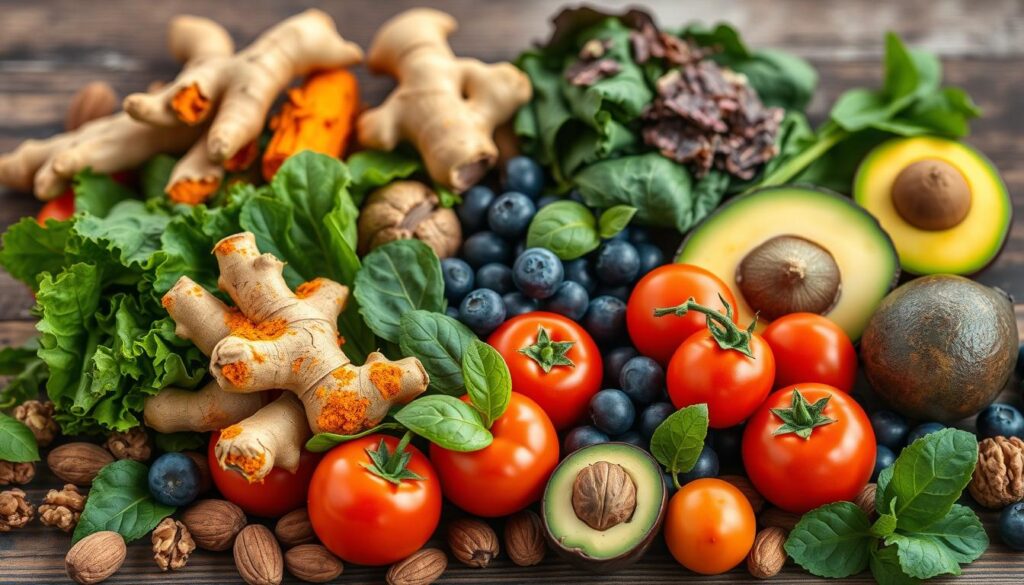
Best Foods to Reduce Inflammation: Top Natural Options
When it comes to fighting inflammation, your diet plays a crucial role. Incorporating the right nutritious anti-inflammatory foods can help reduce inflammation in your body and promote overall well-being. Let’s explore some of the best natural options to consider.
Leafy Greens and Their Anti-Inflammatory Properties
Leafy greens like spinach, kale, and collard greens are powerhouses when it comes to reducing inflammation. These nutrient-dense foods are rich in antioxidants, vitamins, and minerals that help combat inflammation at the cellular level. Incorporating a variety of leafy greens into your daily meals can be an easy and effective way to fight inflammation naturally.
Berries and Antioxidant-Rich Fruits
Berries, such as blueberries, raspberries, and strawberries, are brimming with anti-inflammatory compounds known as anthocyanins. These antioxidants help neutralize free radicals and reduce inflammation throughout the body. Other antioxidant-rich fruits, like cherries and pineapple, can also be excellent additions to an anti-inflammatory diet.
Healthy Fats and Omega-3 Sources
Incorporating healthy fats and omega-3 fatty acids into your diet can also contribute to reducing inflammation. Foods like fatty fish (such as salmon, mackerel, and sardines), nuts, and seeds are excellent sources of these beneficial fats. Consuming these best foods to reduce inflammation can help balance your body’s inflammatory response and support overall health.
“Eating a diet rich in anti-inflammatory foods is one of the most effective ways to combat chronic inflammation and improve your overall health.”
Powerful Herbs and Spices That Combat Inflammation
When it comes to natural remedies for inflammation, herbs and spices stand out as potent allies. These flavorful additions to your diet not only enhance the taste of your meals but also possess remarkable anti-inflammatory properties that can provide relief and support your overall well-being.
One of the most celebrated natural remedies for inflammation is turmeric. This vibrant yellow spice contains a compound called curcumin, which has been extensively studied for its ability to reduce inflammation throughout the body. Incorporating turmeric into your anti-inflammatory eating plan can be as simple as adding it to your favorite dishes or enjoying a warm cup of golden milk.
Ginger is another herb that shines in the fight against inflammation. Known for its distinct flavor and warming properties, ginger contains compounds like gingerol that can help inhibit the production of inflammatory molecules. Whether you opt for fresh ginger root, ginger tea, or ginger supplements, you’ll be tapping into its natural anti-inflammatory benefits.
Lastly, don’t underestimate the power of garlic. This pungent member of the allium family is not only a culinary staple but also a natural remedy for inflammation. Garlic contains sulfur compounds that can help modulate the body’s inflammatory response, making it a valuable addition to your natural remedies for inflammation.
By incorporating these potent herbs and spices into your daily diet, you can harness the power of nature to combat inflammation and promote overall wellness. Experiment with new recipes, try spice blends, or even consider supplements to ensure you’re getting the full benefits of these natural remedies for inflammation.
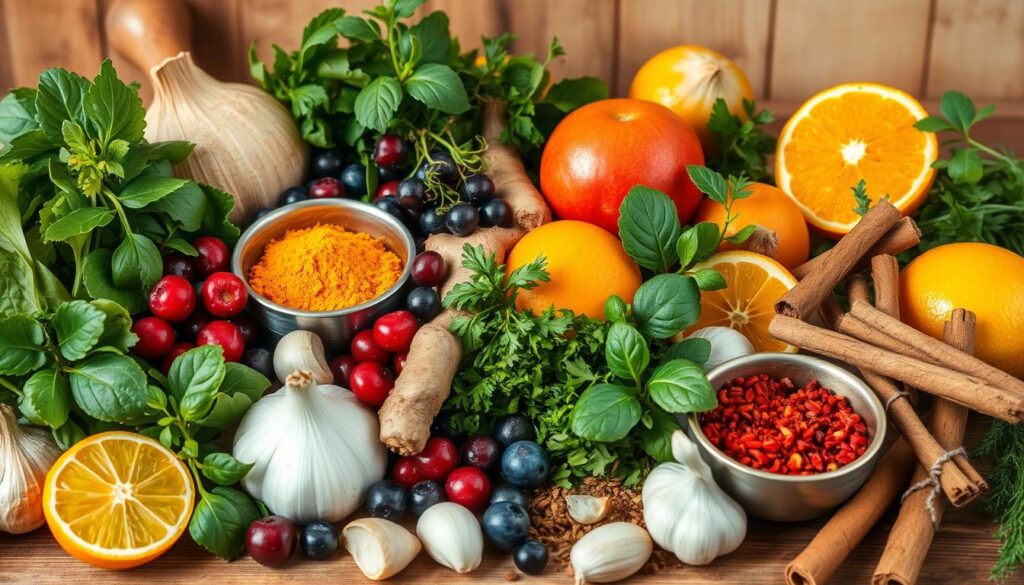
Plant-Based Proteins for Fighting Inflammation
While animal-based proteins can sometimes contribute to inflammation, plant-based proteins offer a wealth of anti-inflammatory benefits. By incorporating a variety of plant-based protein sources into your plant-based anti-inflammatory diet, you can help ease inflammation and support overall health.
Legumes and Pulses
Legumes, such as beans, lentils, and chickpeas, are excellent foods to ease inflammation. These nutrient-dense foods are rich in fiber, antioxidants, and anti-inflammatory compounds like flavonoids and polyphenols. Incorporating legumes and pulses into your meals can help reduce inflammation and promote a healthy gut.
Nuts and Seeds
Nuts and seeds are also fantastic plant-based anti-inflammatory diet options. Almonds, walnuts, chia seeds, and flaxseeds are all great sources of anti-inflammatory omega-3 fatty acids. Additionally, these plant-based proteins contain beneficial vitamins, minerals, and antioxidants that can help combat inflammation.
Plant-Based Protein Alternatives
For those looking to reduce their intake of animal-based proteins, there are numerous plant-based alternatives that can provide foods to ease inflammation. Soy-based products like tofu and tempeh, as well as plant-based meat substitutes, can be excellent sources of protein without the inflammatory effects of animal-based options.
By incorporating a variety of plant-based proteins into your diet, you can create a nutritious and anti-inflammatory diet that helps reduce inflammation and supports your overall health.
The Role of Fermented Foods in Reducing Inflammation
A healthy diet rich in anti-inflammatory foods can be a powerful tool in managing inflammation within the body. One such category of beneficial foods is fermented products, which have gained increasing attention for their gut-supporting and inflammation-reducing properties.
The connection between gut health and inflammation is well-established. When the gut microbiome is out of balance, it can trigger an inflammatory response throughout the body. Fermented foods, such as yogurt, kefir, and kimchi, contain beneficial probiotics that help restore and maintain a healthy gut ecosystem, thereby reducing overall inflammation.
The Benefits of Fermented Foods
- Improved gut health and digestion
- Increased production of anti-inflammatory compounds
- Enhanced immune function
- Reduced risk of chronic diseases linked to inflammation
When it comes to healthy diet for inflammation, fermented foods should be a staple. From the tangy, probiotic-rich goodness of yogurt to the crunchy, flavor-packed kimchi, these natural wonders can be easily incorporated into your daily meals and snacks.
| Fermented Food | Potential Anti-Inflammatory Benefits |
|---|---|
| Yogurt | Contains live cultures that promote gut health and reduce inflammation |
| Kefir | Provides a diverse array of probiotics that support a balanced microbiome |
| Kimchi | Rich in antioxidants and anti-inflammatory compounds from fermented vegetables |
| Sauerkraut | Packed with beneficial bacteria and vitamin C, which can reduce inflammation |
By incorporating these fermented food powerhouses into your healthy diet for inflammation, you can take a proactive step towards supporting your overall well-being and reducing the impact of chronic inflammation.
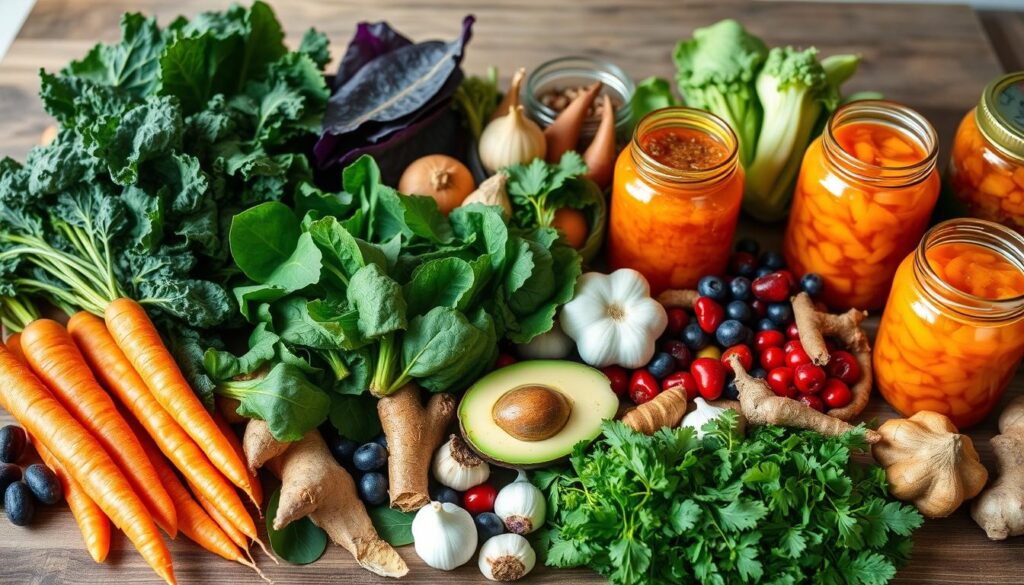
Foods to Avoid When Fighting Inflammation
Adopting an anti-inflammatory eating plan is crucial for maintaining overall health and well-being. However, it’s equally important to identify and avoid the foods that can trigger or exacerbate inflammation in the body. By understanding the common culprits, you can make informed choices and optimize your anti-inflammatory diet.
Processed Foods and Inflammation
Highly processed foods, often laden with additives, preservatives, and unhealthy fats, can contribute significantly to inflammation. These processed items, such as packaged snacks, baked goods, and fast food, should be limited or avoided altogether in an anti-inflammatory eating plan.
Hidden Inflammatory Ingredients
Even seemingly healthy foods can contain inflammatory ingredients that may surprise you. Added sugars, refined carbohydrates, and unhealthy trans fats are common culprits that can wreak havoc on your body’s inflammatory response. It’s essential to read labels carefully and choose whole, minimally processed foods whenever possible.
Common Food Triggers
Certain foods are known to be inflammatory triggers for many individuals. These can include gluten, dairy, nightshade vegetables (such as tomatoes, eggplants, and peppers), and foods high in added sugars or unhealthy fats. Paying attention to your body’s reactions and identifying your personal inflammatory food triggers can help you create a tailored anti-inflammatory eating plan.
By being mindful of the foods that can contribute to inflammation, you can make informed choices and create a anti-inflammatory eating plan that supports your overall health and well-being. Remember, a balanced, whole-food-based diet rich in foods that fight inflammation is the foundation for a vibrant, healthy life.
Creating an Anti-Inflammatory Meal Plan
Designing an effective anti-inflammatory eating plan is crucial for promoting overall health and wellbeing. By incorporating a variety of healthy diet for inflammation options, you can nourish your body with the nutrients it needs to combat inflammation and support optimal function.
Start by focusing on a balanced diet rich in whole, minimally processed foods. Incorporate an abundance of anti-inflammatory superfoods like leafy greens, berries, fatty fish, and turmeric. These nutrient-dense ingredients contain powerful antioxidants and anti-inflammatory compounds that can help reduce inflammation in the body.
- Plan your meals around a foundation of plant-based proteins, such as lentils, chickpeas, and tofu, which are high in fiber and low in saturated fat.
- Include healthy fats from sources like avocado, olive oil, and nuts to support immune function and promote a healthy inflammatory response.
- Hydrate regularly with water and herbal teas, which can help flush out toxins and reduce inflammation.
Remember, consistency is key when it comes to an anti-inflammatory eating plan. Aim to incorporate these nourishing foods into your daily routine, and you’ll be well on your way to a healthier, more balanced lifestyle.
“Eating a diet rich in anti-inflammatory foods is one of the most effective ways to reduce inflammation and support overall health.”
By making informed choices and prioritizing a healthy diet for inflammation, you can take control of your well-being and feel your best.
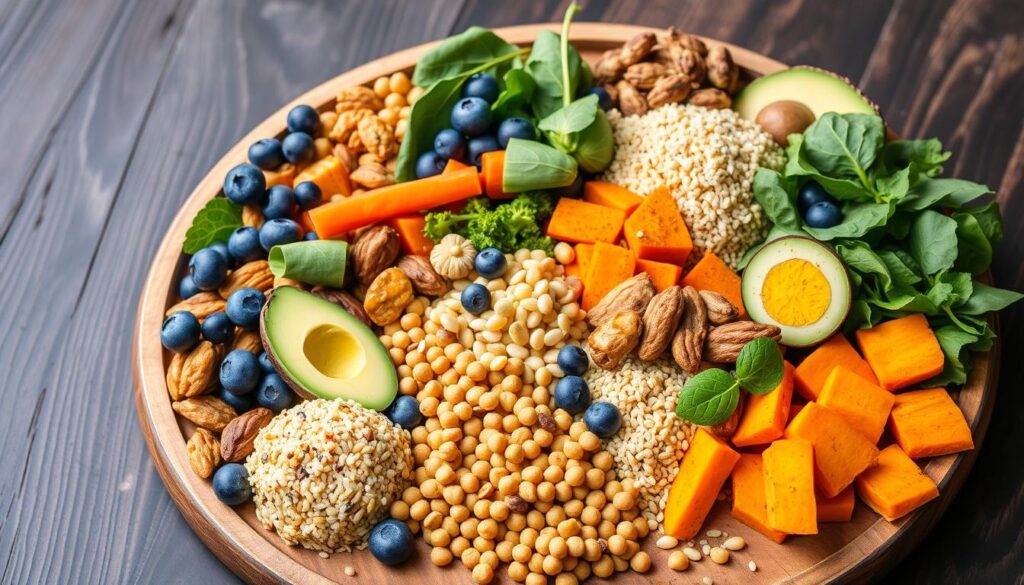
How to Incorporate Anti-Inflammatory Foods Into Your Daily Diet
Incorporating anti-inflammatory foods into your daily diet doesn’t have to be a daunting task. With a few simple strategies, you can easily integrate the best foods to reduce inflammation and foods to ease inflammation into your meals and snacks. Let’s explore some practical tips to make this process seamless.
Simple Meal Prep Ideas
Meal prepping is a game-changer when it comes to maintaining an anti-inflammatory diet. Set aside a few hours on the weekend to chop and store fresh ingredients like leafy greens, berries, and nuts. This will make it easy to quickly assemble healthy salads, smoothies, or grain bowls throughout the week.
Quick Anti-Inflammatory Recipes
Cooking nourishing meals doesn’t have to be time-consuming. Try quick-and-easy recipes that feature anti-inflammatory powerhouses like fatty fish, turmeric, and ginger. Recipes like grilled salmon with roasted vegetables or a chickpea and spinach curry can be made in under 30 minutes.
Smart Snacking Options
Snacks can be a great way to incorporate foods to ease inflammation into your daily routine. Stock up on portable options like fresh berries, raw nuts, and sliced vegetables with hummus. These provide a satisfying crunch while delivering a boost of antioxidants and healthy fats.
By embracing these simple strategies, you can easily weave the best foods to reduce inflammation into your everyday life. With a little planning and creativity, you can enjoy the benefits of an anti-inflammatory diet without sacrificing taste or convenience.
Conclusion
Throughout this article, we’ve explored the power of natural remedies for inflammation, focusing on the remarkable anti-inflammatory properties of various foods. From leafy greens and berries to healthy fats and plant-based proteins, we’ve uncovered a wealth of options to help your body combat the adverse effects of chronic inflammation.
Incorporating these anti-inflammatory foods into your daily diet is a simple yet powerful step towards better overall health. By making informed choices and gradually integrating these nutritious ingredients into your meals, you can harness the body’s natural healing abilities and reduce the risk of inflammation-related conditions.
Remember, a balanced, natural remedies for inflammation approach is the key to long-term wellness. Embrace the vibrant flavors and nourishing benefits of these anti-inflammatory powerhouses, and embark on a journey towards a healthier, more resilient you. Your body will thank you for it.

